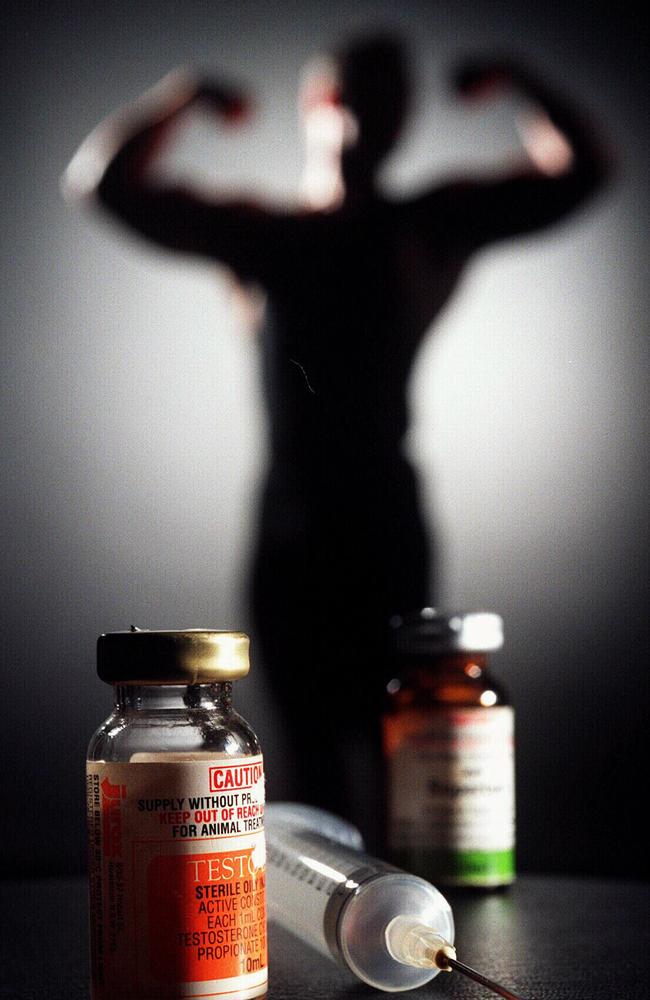Enhanced Games: Top Aussie doc’s warning for performance enhancing drugs push
Organisers are offering huge sums of money for record-breaking athletes in a steroid-fuelled ‘new Olympics’ – but the $1m reward might not outweigh the significant risk, an Aussie doctor says.
Olympics
Don't miss out on the headlines from Olympics. Followed categories will be added to My News.
The Australian Institute of Sports’ top doctor says performance enhancing drugs can have deadly side effects and warned athletes the risk of taking them for the sake of breaking a world record and a $1 million pay out did not stack up.
It follows the news organisers of a ‘new Olympics’ dubbed the Enhanced Games were offering huge sums of money for athletes who were able to break a world record in a select number of sports, including swimming, diving and combat sports, while using performance enhancing drugs.
Athletes who qualified to compete would also receive a significant fee of at least US$100,000.
AIS Chief Medical Officer Dr David Hughes, who is also the Chair of the AOC Medical Commission said the concept of encouraging people to take performance enhancing drugs to win a sporting event went against all good medical practice.


“These substances are prescribed in very restricted situations in Australia for very specific health reasons,” Dr Hughes said.
“Nowhere do medical authorities validate the legalisation of these substances for performance enhancement.
“From where I stand I think the medical practitioners or others who are going to work with this group and allow them to take these substances for performance enhancement are not acting within the boundaries of what we would consider good practice.
“The prescription of performance enhancing drugs when the person has no medical condition and it’s all just about wanting to win at a sport is not aligned with the principles of good medical practice.”
Dr Hughes said there were three main drugs used for performance enhancement; anabolic steroids, Erythropoietin (EPO) and stimulants.
Anabolic steroids can cause heart problems, blood clotting, high cholesterol, liver cancer, kidney failure, mood swings, paranoia, manic behaviour and infertility.
EPO increases red cell mass in the bloodstream and can cause heart attacks, strokes or lead to blood clots in other parts of the body.
Dr Hughes said even short term use of stimulants can cause heart issues, increased blood pressure, hallucinations, aggression and panic attacks.
“At the end of the day we want sport to be about the health of individuals and people taking substances in order to win at the Enhanced Games is a poor idea,” Dr Hughes said.
“Every time a doctor prescribes any substance they weigh up the potential benefits versus the potential side effects.
“Any time a human being takes a medication there’s a possibility that they’ll suffer side effects and doctors frequently decide not to prescribe a medication to a patient because they know that this patient either doesn’t respond or had had a bad reaction to these medications in the past.
“It’s always a balance between the potential benefit against the potential side effects. In this instance I would say there actually isn’t a medical benefit from someone taking these medications but there are definitely potential negatives for them taking it so the risk reward ratio doesn’t stack up from where I see it from the view of good medical practice.”

Dr Hughes said this wasn’t the first time people had tried to rationalise the use of performance enhancing drugs in sport.
He referenced the programs run in Eastern Europe in the 1960s and 1980s.
“I think everyone agrees when they look back at what was going on in Eastern Europe during that time was an abuse by medical staff of athlete’s health,” Dr Hughes said.
“There were athletes of both sexes, including adolescents who were prescribed medications, which were not indicated medically, but were provided to them purely for the reasons of enhancing sports performance.
“And unfortunately, there were many, many sports men and women who have suffered from serious lasting physical and psychological damage as a result of that.”
Dr Hughes labelled the Enhanced Games concept a step backwards.
“It’s got nothing to do with good science. It’s got nothing to do with good medical practice and it’s got nothing to do with winning sport well,” he said.
“We want to promote the idea that Australian athletes win well to inspire Australians and there’s nothing good about winning by way of performance enhancing drugs, that doesn’t inspire anyone.”
Athletes around the world work tirelessly for the chance to represent their country at an Olympics and in turn become a role model for others hoping to achieve the same.
Dr Hughes cautioned the Enhanced Games could prove detrimental to the health of young children.
“I think the vast majority of athletes agree that in accepting that privilege of representing the country, they also accept that there is a responsibility because whether they like it or not, they are role models for young Australians and sending a message to young Australians that it’s okay to take performance enhancing drugs in order to win a sporting event is not a great idea,” he said.
More Coverage
Originally published as Enhanced Games: Top Aussie doc’s warning for performance enhancing drugs push





